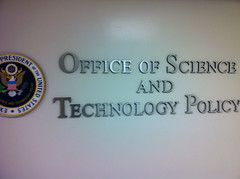OSTP has published the public comments on its RFI on public access to scholarly publications. There are only 375 comments, a small number as theses things go, which suggests that there is not a lot of public interest in this issue. Most of the comments are from institutional players. However, there are some big ideas hidden here.
See http://www.whitehouse.gov/administration/eop/ostp/library/publicaccess for all the comments.
Many of the comments are from libraries. Not surprisingly, these seem to mostly want free open access to all publications (but I have not read them all — far from it, as there are probably thousands of pages). But there is a truly radical funding proposal from my fellow Scholarly Kitchen chef, Rick Anderson, and his colleagues Joyce Ogburn and Allyson Mower at the University of Utah’s J. Willard Marriott Library. They propose this brave new Federal funding formula:
For every $1 spent on conducting research, another $1 needs to be allocated for making the results widely and freely known to tax payers as well as those who benefit the tax payer — nurses, physicians, educators, entrepreneurs, social workers, engineers, demographers, scientists, land managers and the like.
Given that the present federal budget for basic research is about $60 billion, this dollar for dollar matching would be a titanic publishing effort. Actually, it is ambiguous as far as the total dollar amount goes. At the top end it suggests that Congress cough up another $60 billion for publication activities. Either that or we should cut the research budget in half to fund publication, or maybe something in between. Perhaps Rick can explain which is being proposed? In any case, it would be a massive new publication program.
In this light, I encourage our esteemed readers to point out other novel ideas, if they can find them, as I did for Rick Anderson’s amazing proposal. Collectively, we can read the whole corpus, something no one else is likely to do, including OSTP.
Getting back to the comments, the publishers are also represented, both for-profit and not-for-profit. The former include biggies like Springer, Wiley, Sage, and Elsevier, plus a number of smaller publications and presses. Major not-for-profits include AIP, AAAS, IEEE, APA, AGU, PLOS, plus smaller groups.
Then there are a lot of universities, but very few of their presses. Unfortunately, the OSTP labeling makes it hard to tell if a university submission is from a researcher, a department, a press, or a librarian. There is a missive from Oxford University Press, but alas it is not from our own David Crotty, who has been covering this issue for us. Rather it is from the OUP President. Perhaps David kicked it upstairs.
I think it is fair to say that the basic issues are well covered by these comments, but these issues are already well known to Scholarly Kitchen readers (and to OSTP). Everyone wants open access except the publishers, because everyone wants something for nothing, and who can blame them? How it gets paid for is seldom mentioned, as far as I can see. But then as I said, I have only scratched the surface.
I encourage everyone reading to do a little digging for big ideas and report them here for all to cuss and discuss. There may be more than one pony in this pile.
Discussion
7 Thoughts on "Big Ideas in the OSTP RFI Comments"
By way of comparison, a proposed environmental regulation may get 500,000 comments. That is public interest.
Hell yes I kicked it upstairs! OUP has been tremendously supportive of my continuing to write here, but it does so under the condition that my writing here is strictly my own opinion and I am not serving as an official representative of the company’s point of view.
But Niko’s submitted statements were the result of consultation with many within OUP.
Well, David, this puts me in a rather embarrassing situation — but I appreciate you bringing it to my attention.
The comment from which you quote was sent out by my library under the names of our Dean, our Scholarly Communications & Copyright Librarian, and myself. (The SC&C Librarian reports to me, and I report to the Dean.) While I saw the various versions of this comment before it went out, I was not aware (or at least don’t recall being made aware) that it would go out under my name. I assumed it would go out under the name of our Dean, or perhaps simply be attributed to the J. Willard Marriott Library. Had I known that the comment was going to bear my name, I would have proposed somewhat different language, or asked that my name not be used. As it is, I have tremendous respect for the views of my Dean and my SC&C Librarian on all of these issues, but I don’t entirely share them. My own views on the specific issue of redirecting federal money to support open access are more complicated, and are expressed in this posting that I wrote for SK late last year. (You might remember that posting — you submitted several comments on it.)
When you saw the OSTP RFI comment from my library, you must have concluded that I had experienced a pretty dramatic change of heart on the subject over the course of a few months. Checking with me before characterizing the quoted sentence as “Rick Anderson’s amazing proposal” could have cleared up the issue, but I guess I can hardly blame you for assuming that a comment sent out under my name was in fact representative of my views.
Sorry Rick, I was trying to help. I agree with the comment’s sentiment that much more should be spent on dissemination of Federal research results, even if the stated amount is unrealistic under present constraints.
For example, there is a lot of work being done on visualization of the moving frontier, including by me. I think this approach could be very useful in accelerating science and it is probably beyond the scope of any publisher to implement. For another example, I would like to see a National Energy Library, along the lines of NLM (except it would disseminate research reports instead of embargoed journal articles). NLM does a lot of dissemination R&D.
Stewart Wills has posted a link to this Wired article on the newly introduced US bill, the Federal Research Public Access Act (FRPAA):
http://www.wired.com/wiredscience/2012/02/open-science-revolt-occupies-congress/
It basically extends the NIH model to all the major science funding agencies and reduces the embargo period to 6 months or less. So now we have RWA versus FRPAA, which is probably a political stalemate for now. I have been told that several publishers have said they will go to court if something like FRPAA passes. Interesting times.
But it looks like no one is interested in reading the OSTP RFI comments and posting new ideas here. Perhaps there are none, new ideas that is. I still like publishing the research reports and leaving the journals alone. See http://scholarlykitchen.sspnet.org/2012/01/06/my-argument-for-public-access-to-research-reports/.
> Everyone wants open access except the publishers,
> because everyone wants something for nothing, and who can blame them?
> How it gets paid for is seldom mentioned, as far as I can see.
I don’t understand these sentences. Researchers can and do pay for open-access fees, so they do pay for it and are aware that publishing is going to be more expensive for them.
Open access advocates are not necessarily, or even usually, talking about the author pays model. For example, FRPAA mandates that journal articles be surrendered in 6 months or less with no compensation. Other models include replacing journals with simple self-posting archives. Most of the RFI comments from libraries that I have read just want subscriptions to go away, but no model is proposed.




